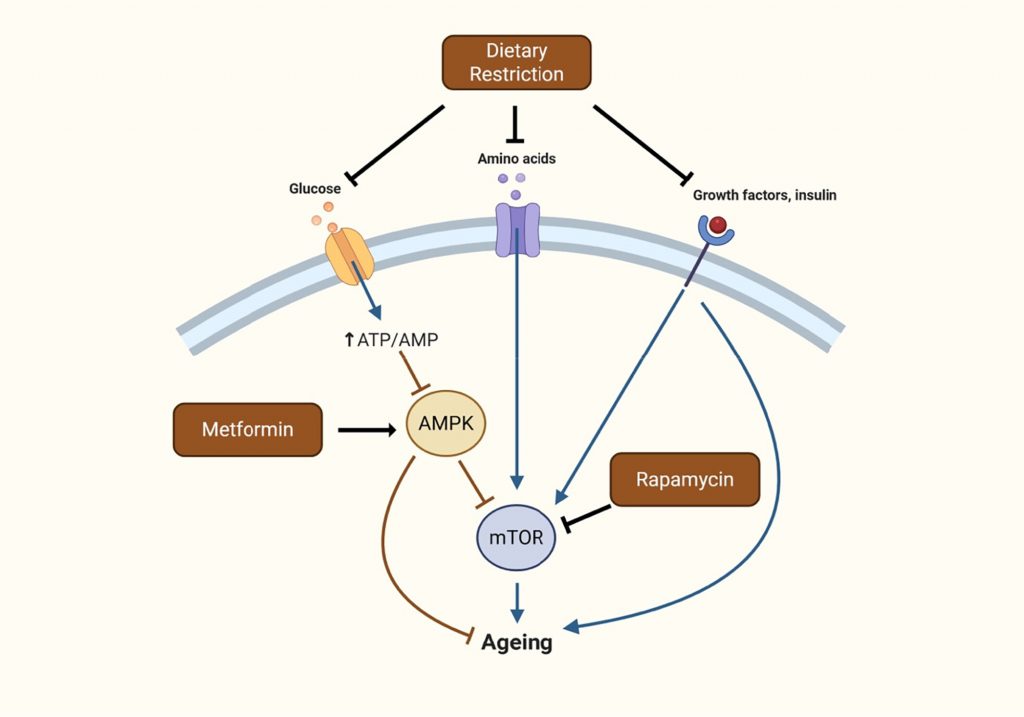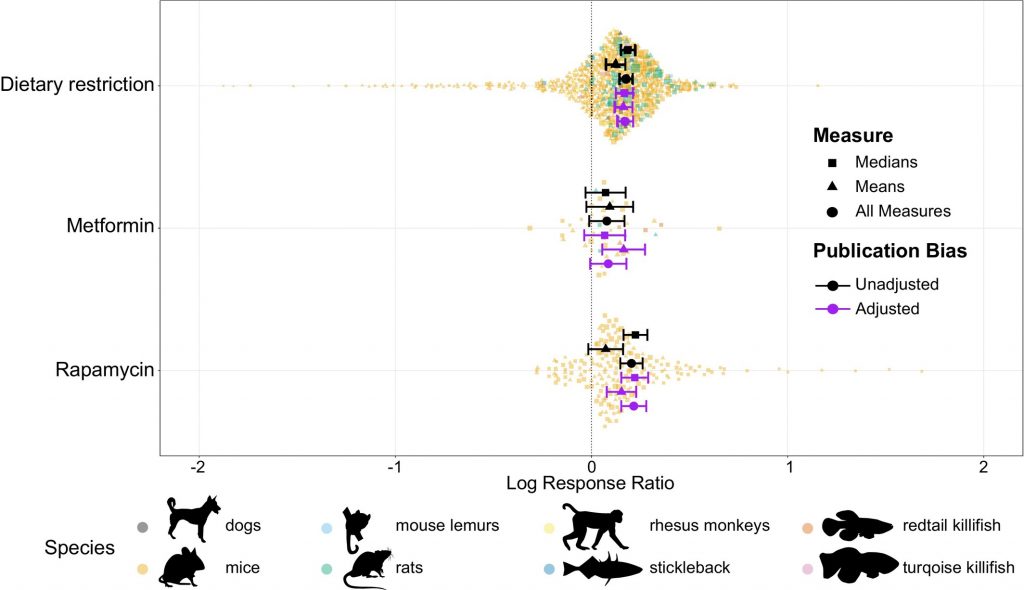Key Points:
- Rapamycin but not the anti-diabetes drug metformin prolongs the lifespan of multiple species in a manner comparable to dietary restriction, the gold standard of longevity promotion.
- There do not appear to be any sex differences, suggesting that both males and females can potentially benefit from both rapamycin and dietary restriction when it comes to possible longevity benefits.
The pursuit of living longer has moved from ancient myths to modern laboratories, where scientists are meticulously unraveling the complex biological processes of aging. Among the most promising avenues of research are dietary restriction (DR) and certain compounds that mimic its effects. A recent meta-analysis, a powerful research method that combines findings from multiple studies, sheds new light on two such mimetics: rapamycin and metformin.
The Promise of Dietary Restriction and Its Mimics
DR, which involves reducing calorie intake without causing malnutrition, has consistently shown remarkable effects in extending lifespan across a wide range of organisms, from tiny worms to complex primates. The science behind DR is robust, demonstrating its ability to slow down the aging process and protect against age-related diseases. However, the practical application of strict, long-term DR in humans requires immense discipline and can be difficult to maintain. This difficulty has spurred a search for compounds that mimic the beneficial effects of DR without requiring drastic dietary changes.
Inhibiting mTOR with Rapamycin
Rapamycin is an inhibitor of a crucial cellular pathway known as mTOR (mechanistic target of rapamycin), which plays a central role in regulating cell growth and metabolism. By inhibiting mTOR, rapamycin essentially tricks the body into thinking it is undergoing DR, thereby activating similar longevity pathways. Rapamycin extends the lifespan of lab animals and is currently being explored for its potential human anti-aging effects. However, like any powerful compound, it comes with potential side effects that need careful consideration.

Activating AMPK with Metformin
Metformin is a widely used medication for type 2 diabetes that works by reducing glucose production in the liver and improving insulin sensitivity. Beyond its role in diabetes management, metformin has also shown promise as a longevity agent, particularly in some invertebrate models. It activates an enzyme called AMPK (AMP-activated protein kinase), a key regulator of mTOR. While its effects on lifespan in humans and other vertebrates have been less consistent and remain a subject of ongoing research, its widespread use and relatively good safety profile make it an attractive candidate for further investigation into its anti-aging properties.
Rapamycin and Dietary Restriction Comparably Extend Life
To elucidate the potential of rapamycin and metformin compared to DR, a team of researchers from the United Kingdom conducted a comprehensive meta-analysis. Their analysis included an impressive 911 comparisons drawn from 167 different scientific papers, encompassing eight vertebrate species, including zebrafish, mice, rats, and even rhesus macaques. This broad scope allowed them to draw generalizable conclusions.
The study confirmed that DR robustly extends lifespan in vertebrates, solidifying DR’s position as a gold standard intervention for longevity. Crucially, the meta-analysis revealed that rapamycin significantly extended lifespan, mirroring the effects of DR, suggesting rapamycin could be a viable alternative to DR for humans.

In stark contrast, metformin did not produce a significant lifespan extension within the scope of this meta-analysis. While metformin has shown some anti-aging effects in simpler organisms like worms and has clear benefits for individuals with type 2 diabetes, these findings suggest that its direct impact on lifespan in healthy vertebrates may be limited. This does not negate metformin’s other health benefits, but it does temper expectations regarding its role as a direct longevity drug for the general population.
The study also explored other important factors. Interestingly, the researchers found no consistent sex-specific effects on lifespan extension across any of the treatments. This suggests that the benefits of DR and rapamycin are likely to be similar for both males and females. Furthermore, the type of DR methodology (fasting versus caloric reduction) did not significantly alter the magnitude of lifespan extension, indicating that both approaches can be effective.
Study Limitations
While the findings are promising, the meta-analysis also highlighted some important considerations. The researchers noticed that the effects of DR, rapamycin, and metformin varied considerably from one study to another. This variability can be attributed to a multitude of factors, including differences in genetic backgrounds and specific experimental protocols. While the meta-analysis accounted for some of these factors, much of this variability remains unexplained.
“For now, nobody should run to their doctor asking for prescriptions of rapamycin to live longer. But this drug, extracted from obscure soil bacteria, shows us that interfering with a single molecular pathway can be enough to mimic the benefits of eating less. The challenge is to use this discovery to produce therapies that make us healthier for longer without compromising our quality of life – or our taste for the occasional slice of chocolate cake,” said Sahida Sultanova, PhD, one of the researchers who conducted the study.
Human Subjects
This meta-analysis provides compelling evidence that rapamycin, but not metformin, closely mirrors the lifespan-extending effects of DR. This has significant implications for the development of new strategies to promote healthy aging.
“The preliminary signs are encouraging. In an ongoing human rapamycin trial, volunteers given low, intermittent doses of rapamycin have experienced positive effects on indicators of healthspan. For metformin, the human trial is still in progress and the findings are expected to be out in a few years’ time,” said Sultanova.